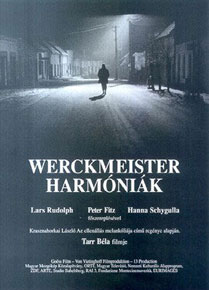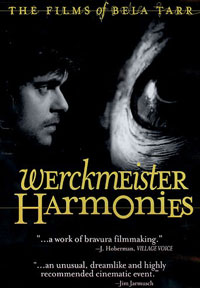 The stark black & white cinematography of Werckmeister Harmonies (Werckmeister harmoniak, 2001) is a throwback to the greatest European films including Fredrico Fellini's The Road (La Strada, 1954) & Vittorio de Sica's Bycycle Thief (Ladri di biciclette, 1948), although Harmonies is a shocking blend of cinema verite with a distinctly Hungarian Naive art influence that combines peasant folklore with a sophisticated expressionist symbolism.
The stark black & white cinematography of Werckmeister Harmonies (Werckmeister harmoniak, 2001) is a throwback to the greatest European films including Fredrico Fellini's The Road (La Strada, 1954) & Vittorio de Sica's Bycycle Thief (Ladri di biciclette, 1948), although Harmonies is a shocking blend of cinema verite with a distinctly Hungarian Naive art influence that combines peasant folklore with a sophisticated expressionist symbolism.
It has evoked comparisons to David Lynch of Eraserhead (1977) & just about anything by Tarkovsky. But anyone who has seen the works of Hungarian, Bulgarian, and Slavic naive painters like Viktor Magyar, Radi Nedelchev, or Franjo Filipovic, may detect a native tradition deeply imbedded in Bela Tarr's film, wherein worlds of pastorality & tenderness collide with worlds of primitivism & cruelty.
It's an astonishing technical feat in that its feature length exceeds two hours yet there are just thirty-nine shots, some of them nearly static as they show long slow perambulations of sundry characters, others very elaborate in their set-ups so that one barely realizes there are no actual jumpcuts from one scene to the next for long patches.
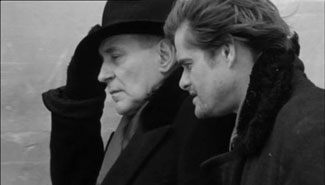 Allusive in its plotting, there is such an intensity of character & place that it may take a long while to realize the poeticisms override the usual story-structure of beginning-middle-end filmmaking. It must almost be appreciated as a living painting rather than for the narrative. Allusive in its plotting, there is such an intensity of character & place that it may take a long while to realize the poeticisms override the usual story-structure of beginning-middle-end filmmaking. It must almost be appreciated as a living painting rather than for the narrative.
The film's symbolism is rooted forward & backward, of a timeless place that remains little changed in a century, but which is constantly menaced from within & without by totalitarian vs revolutionary extremes, forces that shape the fates of masses & individuals without clear demarcations for source & cause, let alone for purpose or value.
It's closing time at the village tavern, wherein drunkards re-enact a childish game which requires them to dance as heavenly bodies. These scruffy guys turning child play into poetry is an incredibly beautiful fantasy of human decency & imaginativeness; it almost makes one wish to live in such a place where people can be like this, notwithstanding that it is also a place of horror.
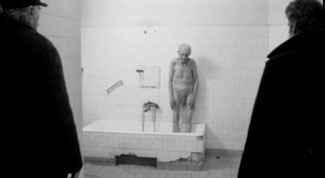 We're indeed in the realm of visual poetry with the black & white camera work transforming a harash peasant setting into a world of magic realism. We're indeed in the realm of visual poetry with the black & white camera work transforming a harash peasant setting into a world of magic realism.
Our point of view character is Janos (Lars Rudolph) has a young-old face of innocence, but which we shall observe slowly changing into the face of discouragement & madness. He lives with & cares for his Uncle Gyorgy (Peter Fitz), though everyone in town is either his uncle or his auntie. He has regular "rounds" ostensibly as postman, though as he travels through the village he is taking care of sundry people's needs, & he seems to be loved by everyone.
Then things begin to change, as though the cold darkness of the environment were an infection. The worst of it begins with the arrival by night of a so-called Circus Fantastikus which consists of one huge metal shed pulled by truck, which is parked in the town square. For a coin one gets to enter the enormous tin shed to look at a dead stinking whale. There's also the promise of there being a Prince whose act is unknown, who we will never more than barely glimpse, & whose mystical powers are implied but at no time overtly exhibited.
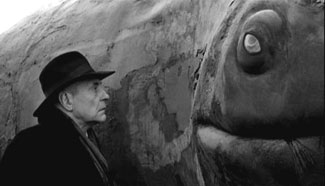 The presence of the stinking exhibit & the mesmeric authority of the Prince has in previous villages incited riots without reasonable cause. Janos's village, too, is suddenly set on edge, while rough men gather in the square where the big tin shed has been parked. The presence of the stinking exhibit & the mesmeric authority of the Prince has in previous villages incited riots without reasonable cause. Janos's village, too, is suddenly set on edge, while rough men gather in the square where the big tin shed has been parked.
It is never clear who these men are; they may be a ragtag army that just follows the exhibit, drawn to the fetid whale like flies, or minions of the unseen Prince. Or they may be locals who in such freezing climate would not ordinarily be out & about, but are compelled to linger endlessly in the square. Whoever they are, they light bonfires & stand around these, apparently having no more than the vaguest of plans & intentions, menacing without movement.
Janos's "aunt" Tundie (Hanna Schygulla) about half blackmails Janos into putting himself in the middle of the pending riot, serving as spy. He learns of the terrible Prince who the Fantastikus manager is attempting to keep locked up so that the riots won't happen again, though even from his hidden place he effects the village.
With glacial pacing, a beautiful score, & a unique blend of naturalism & surrealism, the town slowly, slowly slides inexhoribly toward mayhem & death. The senseless rebellion brings government forces which only add to the chaos. Tyrannical powers have Janos's name on a list of spies & instigators, & it doesn't matter that he's innocent of any wrongdoing. Once one is on the list they're doomed.
Wreckmeister Harmonies is like a dream, & I mean that literally. Over many years I've periodically had the weirdest damned dreams packed with delight, wonder, decency, indecency, chaos, & horror. I've occasionally, just before slumber, wished or prayed for one more dream of that sort. And for that reason I'm grateful for Wreckmeister Harmonies.
copyright © by Paghat the Ratgirl
|
